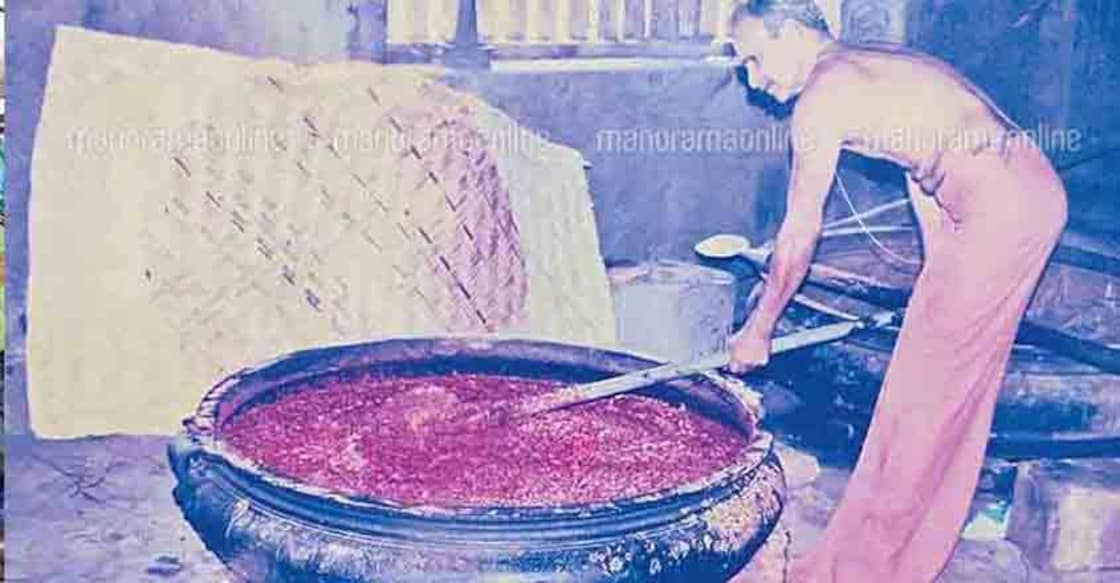Famed temple cook of Muttassu household will be missed

Mail This Article
The man who served devotees the holy breakfast at the Mahadeva temple in Vaikom was like a famed figure straight out of the 20th-century Malayalam book on Kerala's medieval legends, Aithihyamala. Today, Muttassu Vasudevan Namboodiri has himself receded into past, leaving behind the unique taste of his dishes as a sweet memory to cherish all life.
Muttassu is the name of a Brahmin household in south-central Kerala, having made it to the fabled storybook penned by folklore collector Kottarathil Sankunni (1855-1937), also a Sanskrit scholar. Its tenth chapter on Muttassu Namboodiri, acclaimed for his culinary skills, serves out a string of anecdotes. His family is from the coastal village of Vaikom, a town in Kottayam district.
Vasudevan Namboodiri, who died the other day, was a legatee of the Muttassu household. Living to his family's reputation, the curries he prepared were so yummy that all that the eater needed to do was to just sit and relish them. One used to enjoy that luxury during the morning hours at the Mahadeva temple in Vaikom till recently.
It's said even the shrine's deity, also called 'annadana prabhu' (great giver of food) locally, is an avid admirer of the dishes the family prepared for him. They are prepared at the temple kitchen called 'Thidappally.' Vasudevan Namboodiri served his deity for a good five decades.
The list of offerings at the temple shows this one special item – prathal vazhipadu. It is food, effectively a feast, prepared to propitiate the lord, a portion of which goes to the devotee after being sanctified through a pooja. Though 'prathal' means breakfast, this is a feast served practically as lunch served in the oottupura after entering long dining room, which could be entered after a standing in a usually long queue.
Generations of people in Vaikom and around have routinely known the taste of the food prepared by the Muttassu household. The priests from that family get up daily in the wee hours and, after bathing, reach the temple through the eastern gateway. At the Thidappally, he lights the oven. The first amber is taken out in a piece of plantain leaf and presented before the deity in the sanctum sanctorum. It's then returned. Only after this ritual would the cooking of the prathal actually begin. This is the sight that early birds at the shrine would now miss with the death of Vasudevan Namboodiri.
The Muttassu family, which resides just east of the temple, has for long been a link between legend and reality. Vasudevan Namboodiri lived his life, meeting people's expectations and sustaining their respect for the household.
The legend goes thus
Once the holy man called Vilwamangalam Swamiyar came before noon for a darshan at the Vaikom shrine. Inside the sanctum sanctorum, he couldn't sense the presence of the lord. So he roamed in the temple precincts. At the big kitchen he saw a Brahmin helping others in the cooking. Swamiyar knew it was none other than Shiva in disguise. On seeing the new guest, the lord-as-Brahmin handed over the long ladle to a fellow cook, saying "Hey Muttassu Namboodiri, you hold this", and disappeared in a jiffy.
It is believed that from that day, the household earned the responsibility as the chief cook at the temple. Since then, it became customary for the family to have its member first lighting the ember at the Thidappally before the break of dawn and then start the day's cooking. Vasudevan Namboodiri never deviated from the tradition.
Before noon, when the daily procession carrying the deity around gets over within the outer walls of the shrine, the lord is customarily served with all the items of the feast. After that, the fellow priests take their share of the food, sitting inside the roofed area called nalambalam. Once that is over, the rest of the food is served for the general public waiting at the oottupura.

